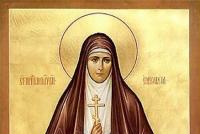Martin Luther - biography, information, personal life. The strange death of martin luther martin luther education
Martin Luther is a short biography of the Christian theologian, the initiator of the Reformation, the translator of the Bible into German.
Martin Luther biography briefly
The future figure and reformer was born into the family of a miner on November 10, 1483 in Saxony. When the baby was six months old, the family moved to Mansfeld, where his father received the status of a wealthy burgher.
At the age of 7, his parents sent Martin to a city school, where he was constantly humiliated and punished. For seven years of study here, the young man only learned to write, read and learned 10 commandments, several prayers.
In 1497, the parents sent 14-year-old Martin to the Franciscan school in Magdeburg. At that time, Luther and his friends earned their bread by singing under the windows of the pious inhabitants.
In 1501, he entered the Faculty of Philosophy at the University of Erfurt. The young man stood out noticeably among his peers with the ability to easily assimilate even complex materials and an excellent memory. In 1503, the young Luther received a bachelor's degree and an invitation to lecture on philosophy. In parallel with his work, he studied the basics of legal affairs. Once, after visiting the university library, he received a Bible that changed his life.
After graduating from the university, the philosopher decided to devote himself to the service of God, refusing worldly life. In the temple, he performed the work of a gatekeeper, served the elders, swept the churchyard, wound the tower clock, collected alms in the city.
In 1506, Luther took the monastic vows. In 1507 he was ordained a priest.
In 1511 he visited Rome, where he first encountered the conflicting facts of Catholicism. A year later, Martin Luther holds the position of professor of theology, in 11 monasteries he acts as caretaker and reads sermons.
In 1518, a papal bull was issued, which caused conflicting thoughts in the theologian and disappointment in Catholic teachings. The philosopher wrote his 95 theses, refuting the postulates of the Roman Church. Martin Luther's speech with 95 theses brought him popularity in society. They said that the state does not depend on the clergy, and the clergy should not act as an intermediary between the Lord and the person. The figure categorically did not accept the requirements and sayings regarding the celibacy of spiritual representatives. Thus, he destroyed the authority of the decrees issued by the Pope. His stance was bold and shocking.
In 1519, the Pope invited Martin Luther to his court, but he did not appear. Then the pontiff anathematized the Protestant, that is, excommunicated him from the holy sacraments.
In 1520, the philosopher publicly burns the bull of the Pope and calls on the people to fight against papal dominance. For this, he was deprived of his Catholic rank. According to the Edict of Worms of May 26, 1521, Martin is accused of heresy. Supporters of the reformer save him by staging a kidnapping. Luther moved to Wartburg Castle and began translating the Holy Scriptures into German.
The public activity of Martin Luther led to the fact that in 1529 his Protestantism was officially accepted by society and began to be considered a current of Catholicism.
Until the end of his days, he worked hard: he preached, lectured, wrote books.
The last years of his life, Luther suffered from chronic ailments. He died in Eisleben February 18, 1546.
Martin Luther - leader of the Reformation in Germany, the founder of German Protestantism. He translated the Bible into German, approving the norms of the common German literary language. Zodiac sign - Scorpio.
Martin Luther was born November 10, 1483, in Eisleben, Saxony, in the family of a former miner who became one of the owners of smelters and copper mines. After graduating from the University of Erfurt in 1505 with a master's degree, Luther entered the Augustinian monastery in Erfurt. In 1508 he began lecturing at the University of Wittenberg (from 1512 doctor of theology).
Intelligence plus character are the aims of true education.
Luther Martin
In the context of the rise of the social movement in Germany, criticism of the Catholic Church, Martin Luther came up with 95 theses against indulgences (posted theses on October 31, 1517 on the doors of the Wittenberg Castle Church). These theses contained the main provisions of his new religious teaching (which he later developed in other writings), which denied the basic tenets and the entire structure of the Catholic Church. Rejecting the Catholic dogma that the church and the clergy are necessary mediators between man and God, Luther declared the Christian's faith the only way to save the soul, which is bestowed upon him directly by God (the thesis of justification by faith alone).
Riots are the language of those who have not been listened to.
Luther Martin
Martin Luther argued that worldly life and the whole worldly order, which provides a person with the opportunity to give himself to faith (the secular state and its institutions), occupy an important place in the Christian religion. He rejected the authority of papal decrees and epistles (Holy Tradition) and demanded the restoration of the authority of Holy Scripture. Luther rejected the claims of the clergy to a dominant position in society. M. Luther limited the role of the clergy to teaching Christians in the spirit of humility, the realization by a person of his complete dependence on the mercy of God in the salvation of his soul. Of great historical importance was the proclamation by Luther of the idea of independence of a secular state from the Catholic Church.
He who accepts evil without resistance becomes its accomplice.
Luther Martin
The theses of Martin Luther were perceived by the opposition strata of the population as a signal to speak out against the Catholic Church and the social order sanctified by it, and the Reformation movement went beyond the boundaries that Martin set for it. Relying on the social movement in Germany, Luther refused to appear at a church court in Rome, and at the Leipzig dispute with Catholic theologians in 1519, he openly declared that he considered the positions put forward by the Czech reformer Jan Hus to be correct in many respects.
In 1520, Luther publicly burned a papal bull excommunicating him from the church in the courtyard of the University of Wittenberg. In the same year, in an address "To the Christian Nobility of the German Nation," he announced that the fight against papal dominance was the business of the entire German nation. But in 1520-1521, when the interests of the various classes that had joined the Reformation began to demarcate, and Thomas Müntzer entered the political arena, showing a new, popular understanding of the Reformation, Martin Luther began to move away from the radical position he had originally taken, specifying that Christian freedom should be understood only in the sense of spiritual freedom, with which bodily lack of freedom (including serfdom) is fully compatible. From persecution under the Edict of Worms in 1521, Luther sought protection from the princes, hiding in the castle of Wartburg, Elector Frederick of Saxony. From that time on, Luther's sharp speeches began against the radical burgher trends of the Reformation (Andreas Karlstadt) and especially against mass popular uprisings. Luther pointed out that secular power is obliged to protect the existing social order by the power of the sword. During the Peasant War of 1524-1526, he demanded a bloody reprisal against the rebellious peasants and the restoration of serfdom.
In the end, we will not remember the insults of our enemies, but the silence of our friends.
Luther Martin
Martin Luther also entered the history of German social thought as a cultural figure - as a reformer of education, language, and music. He not only experienced the influence of the culture of the Renaissance, but in the interests of fighting the papists sought to use folk culture and did a lot to develop it. Of great importance was Luther's translation into German of the Bible (1522-1542), in which he managed to establish the norms of a common German national language.
Martin Luther - head of the Reformation in Germany, Christian theologian, founder of Lutheranism (German Protestantism); he is credited with translating the Bible into German and establishing the norms of the common German literary language. He was born in Saxony, Eisleben, on November 10, 1483. His father was the owner of copper mines and a smelter, who had come out "into people" from miners. At the age of 14, Martin entered the Marburg Franciscan school.
Fulfilling the will of his parents, the young man enters the University of Erfurt in 1501 to receive a higher legal education. After completing a liberal arts course and receiving a master's degree in 1505, Luther began to study jurisprudence, but he was much more interested in theology.
Ignoring the opinion of his father, Luther, remaining in the same city, goes to the monastery of the Augustinian order, where he takes up the study of medieval mysticism. In 1506 he became a monk, the following year he was ordained a priest. In 1508, Luther arrives at Wittenberg University to lecture. To become a doctor of theology, he studied in parallel. Sent to Rome on behalf of the order, he was greatly impressed by the depravity of the Roman Catholic clergy. In 1512 Luther became a doctor of theology and a professor. Teaching activity was combined with reading sermons and acting as the caretaker of 11 monasteries.
In 1517, on October 18, a papal bull was issued on the remission of sins and the sale of indulgences. On October 31, 1517, on the doors of the Castle Church in Wittenberg, Martin Luther hangs out 95 theses composed by him, criticizing the Catholic Church, rejecting its main postulates. According to the new religious teaching put forward by Luther, a secular state should not be dependent on the church, and the clergy themselves do not have to act as an intermediary between God and man, Luther assigned him the role of a mentor of Christians, an educator in the spirit of humility, etc. They rejected the cult of saints, the demand for celibacy of clerics, monasticism, and the authority of papal decrees. The opposition-minded population saw in Luther's teachings a call to overthrow the authority of Catholicism, as well as to speak out against the social order with which he was one.
Luther was summoned to Rome for a church trial, however, feeling public support, he did not go. In 1519, during a dispute with representatives of Catholicism, he openly voiced his agreement with many of the theses of Jan Hus, the Czech reformer. Luther is anathematized; in 1520, in the courtyard of the university, he arranges a public burning of a papal bull, in which the head of the Catholics excommunicates him from the church, and in his appeal “To the Christian nobility of the German nation” the idea is heard that the cause of the whole nation is the struggle against papal dominance. Later, in 1520-1521, with a change in the political situation, his calls become less radical, he interprets Christian freedom as spiritual freedom, which is compatible with bodily lack of freedom.
Support for the Pope is provided by Emperor Charles, and during the years 1520-1521. Luther takes refuge in Wartburg Castle, owned by Elector Friedrich of Saxony. At this time, he begins to translate the Bible into his native language. In 1525, Luther arranges his personal life by marrying a former nun who bore him six children.
The next period of Martin Luther's biography is marked by harsh criticism of radical burgher reformist trends, popular uprisings, and demands for reprisal against the rebels. At the same time, the history of German social thought captured Luther as a person who made a great contribution to the development of folk culture, a reformer of the literary language, music, and the education system.
Martin Luther's report will briefly tell you a lot of useful information about this outstanding personality, the founder of Protestantism, theologian and reformer.
Message about Martin Luther
The future figure and reformer was born into the family of a Saxon miner on November 10, 1483. The father of the family was a very hardworking person and tried to provide for his family with everything. When the baby was six months old, they moved to Mansfeld, where his father received the status of a wealthy burgher.
At the age of 7, his parents sent Martin to a city school, where he was constantly humiliated and punished. For seven years of study here, the young man only learned to write, read and learned 10 commandments, several prayers. In 1497, Luther entered the Magdeburg Franciscan school, but a year later he was transferred to Eisenach due to lack of finances. One day, young Martin met Eisenach's wealthy wife, Ursula. She revealed a favor for him and decided to help by inviting him to temporary residence in her house.
In 1501, he entered the Faculty of Philosophy at the University of Erfurt. The young man stood out noticeably among his peers with the ability to easily assimilate even complex materials and an excellent memory. In 1503, the young Luther received a bachelor's degree and an invitation to lecture on philosophy. In parallel with work, at the insistence of his father, he studied the basics of legal affairs. Once, after visiting the university library, a Bible fell into his hands. After reading it, the young man's inner world turned upside down. However, like the life of Martin Luther: after graduating from the university, the philosopher decided to devote himself to serving God, abandoning worldly life. No one could have foreseen such an act and no one expected it. In the temple, the theologian performed the work of a gatekeeper, served the elders, swept the churchyard, wound the tower clock, collected alms in the city.
In 1506, Luther takes monastic vows, and a year later he takes the priesthood, taking on a new name, Augustine. In 1508 he was recommended by the vicar general for a teaching position at the University of Wittenberg. Augustine himself did not stop developing, studying foreign languages and receiving a biblical bachelor's degree.
In 1511 he visited Rome, where he first encountered the conflicting facts of Catholicism. A year later, Martin Luther holds the position of professor of theology, in 11 monasteries he acts as caretaker and reads sermons.
In 1518, a papal bull was issued, which caused conflicting thoughts in the theologian and disappointment in Catholic teachings. The philosopher wrote his 95 theses, refuting the postulates of the Roman Church. Martin Luther's speech with 95 theses brought him popularity in society. They said that the state does not depend on the clergy, and the clergy should not act as an intermediary between the Lord and the person. The figure categorically did not accept the requirements and sayings regarding the celibacy of spiritual representatives. Thus, he destroyed the authority of the decrees issued by the Pope. His stance was bold and shocking.
In 1519, the Pope invited Martin Luther to his court, but he did not appear. Then the pontiff anathematized the Protestant, that is, excommunicated him from the holy sacraments.
In 1520, the philosopher publicly burns the bull of the Pope and calls on the people to fight against papal dominance. For this, he was deprived of his Catholic rank. According to the Edict of Worms of May 26, 1521, Martin is accused of heresy. Supporters of the reformer save him by staging a kidnapping. Luther moved to Wartburg Castle and began translating the Holy Scriptures into German.
The public activity of Martin Luther led to the fact that in 1529 his Protestantism was officially accepted by society and began to be considered a current of Catholicism.
Until the end of his days, he worked hard: he preached, lectured, wrote books. Martin Luther died suddenly in February 1546.
- The real name of the philosopher and theologian Luder. Having become a monk, he took a more sonorous surname.
- Luther's future wife was a nun who had previously given a celibate dinner. Her name was Katerina. In 1523, he helped her and 12 other girls escape from the convent. When they got married, she was 26 years old, and he was 41. 6 children were born in the marriage.
- Over the years, Martin Luther began to suffer from dizziness, sudden fainting. The philosopher became the owner of a stone disease.
- It is believed that the figure was the first person who put up a Christmas tree at home for Christmas, decorating it with small candles and fruits.
- According to Historychannel, in 2004, an archaeological excavation of Martin Luther's house was carried out. A sensational discovery was made: his house had sewerage and even primitive floor heating.
We hope that the "Martin Luther" report helped to learn a lot of useful information about the life of this outstanding figure in Germany. And you can add a short message about Martin Luther through the comment form below.
Martin Luther (11/10/1483 - 02/18/1546) - Christian theologian, initiated the social and political movement in Europe - the Reformation. One of the Protestant currents in Christianity is named after him.
early years
Martin was born on Saxon soil, in the city of Eisleben (Germany). His father mined copper in mountain mines. With the birth of a boy, the family moved to Mansfeld, where their business went uphill, and the Luthers became wealthy citizens.
When Martin was fourteen, he began to study at a Catholic school in Magdeburg. With friends, the boy worked part-time, singing church songs at the houses of believers.
In 1501, his parents sent him to be educated at the University of Ertfurt. Then among the burghers it was believed that the best education for a man was higher legal education. However, Martin studied at the faculty of the "seven liberal arts". After receiving a master's degree, he began to study legal sciences.
In 1505 he decided to become a monk, despite his father's objections. There are different versions of the reasons for this choice. According to one of them, this happened from too strict upbringing, according to another, because of Luther's oppressed mood and awareness of his sinful life. There is also a legend according to which he was frightened by a strong thunderstorm and decided to change his life. Perhaps the young man was influenced by communication in humanist circles.
Luther's parents - Hans and Margarita (artist L. Cranach)
The process of becoming a monk was rather difficult for Luther, but he made every effort to carry out his decision. Strictly followed all the rules, distinguished by exemplary behavior. He became a member of the Augustinian Order, which was headed by his friend I. Staupitz. He took a vow of monasticism in 1506, a year later he received the priesthood.
Teaching activity
From 1508, Luther became a teacher at Witterberg University. At this time, he studies the writings of Blessed Augustine. One of his students was the German writer E. Alberus. Martin combined his teaching activities with his own education, in 1512 he received a doctorate in theology.
One day Luther made a trip to Rome, from where he returned under great impression. He was struck by the depravity of the Roman clergy. He himself was very pious, constantly felt his weakness before God, carefully studied biblical texts. In addition to teaching, he was also a caretaker in 11 monasteries, as well as a church preacher.

Luther at the Diet of Worms (Werner, 1877)
Reformation
In 1517, Martin made a sharp criticism of the church, expressed in the "95 Theses". Such a reaction occurred as a result of the bull of the Pope on the sale of indulgences. In general, the theses expressed the denial of the basic dogmas and the Catholic system, the mediation of the church between people and God. In 1519, the Leipzig Debate took place, at which Luther declared that he doubted the righteousness of the papacy. As a result, he is anathematized. Luther, within the walls of the university, publicly burns a bull about his excommunication and calls on the German nobles to fight against papal dominance.
In 1521, he was summoned to the Reichstag of Worms, where he explained himself to Emperor Charles V, a supporter of the Pope. By his edict of May 26, the emperor declared Luther a heretic and banned his writings. On the way from Worms, the theologian was abducted by Frederick of Saxony and was hidden in Wartburg Castle. Here he spent more than one year, began to translate the Bible into German with the help of Professor K. Kruziger. Luther's supporters began to be subjected to repression, and a social movement began to rise in Germany. One of the consequences was the Peasants' War, during which Luther harshly condemned the rebels.

Portrait of Luther (L. Cranach, 1526)
In 1525, he married 26-year-old Katharina von Bora, who bore him six children. His wife was a former nun who decided to run away from the convent after reading his writings. Martin decided to find worthy husbands for her and the eleven girls who had run away with her, but he married Katharina himself. The family lived in a former monastery, the wife was engaged in housekeeping and was a faithful support to her husband.
In 1529, Luther published the Large and Small Catechisms, in which he sets out the foundations of Christianity. The Small Catechism is addressed to the laity, while the Large Catechism is addressed to the pastors. Despite the persecution, Luther was active, visiting parishes, preaching in churches. Before his death, he was ill a lot, he died in Eisleben.
In Germany, he is considered a great reformer who influenced culture, education and other aspects of German society. Luther had a special relationship with music, he was very fond of this art form. He took part in the creation of the church repertoire, wrote songs. His translation of the Bible helped to strengthen the foundations of the German language. Several films have been made about the life of Martin Luther.






